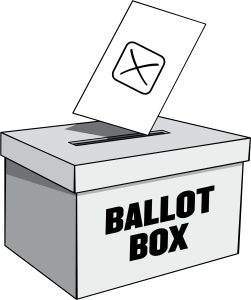Why Vote, Part Two
By now you have likely read about the federal election outcome in the Quebec riding of Terrebonne, where a judicial recount determined that Liberal candidate Tatiana Auguste had defeated Bloc candidate Nathalie Sinclair-Desgagné by a single vote. Elections Canada says the result is final, the Bloc Quebecois is going to court to ask that a by-election be ordered, due to irregularities in the way some mail-in ballots were addressed.

Leaving all the wrangling aside, here is the example, if you want one, of why ‘every vote counts’. If this result is not overturned – and who knows? – then every Liberal voter in that riding can say to themselves ‘I decided who would be my MP.’ And, every potential Bloc voter who did not vote can kick themselves and say – ‘I could have prevented my being represented in Parliament by a Liberal.’
Of course, this happened in one of 343 ridings in this election, so that means the typical Bloc or Liberal voter across the country was still looking at a 1 in 343 chance of ‘counting’ in this election, and if you add in all the federal elections ever, well…..I continue to maintain that ‘your vote making a difference’ is a bad reason to get up and vote, and that almost no one does so for that reason.
On the other hand, this does illustrate why I also wrote that if – for whatever reason – you do vote, it only makes sense to vote for the candidate you would most like to see in office.
Here’s another thing to think about with respect to voting, now that we won’t have to do so for awhile….we hope.
There is a legitimate sense in which each vote counts, I think. That is, there is something that happens for certain if you go out and vote, it does not happen with some miniscule ‘zero out to six decimal places’ probability. If you go to the polls and vote for candidate A, then there is no doubt about the fact that when the results are posted, candidate A, win or lose, will have X votes beside his/her name, rather than X – 1 votes. You don’t know what X will be on election day when you make your decision, of course, but you know that it will be one higher because you voted. Your vote will count, for certain, in the sense that it will be recorded and be part of the public record of the election.
One reason we have elections, I suggest, is to find out what people think about candidates and parties. It is often said, when a candidate wins by a large margin, that they have a true mandate. If the margin is thin, as it clearly was in Terrebonne, the winning candidate, whoever it turns out to be, knows that they might, but for different weather on election day, have lost. This is going to affect how they behave while in office, unless they’re foolish.
So, by voting, you are doing your little bit to keep the winning candidate on their toes, if it is not who you voted for, by reducing their margin of victory. On the other hand, if your candidate wins, you have done your bit to reassure them that they can behave in ways consistent with being the most popular choice for your riding.
Your contribution is small, to be sure – one vote added to or subtracted from the winning margin – but it is not uncertain, and it is a matter of public record.
I think that is why I vote, fundamentally. To have my (admittedly tiny) voice heard. To see one more vote in the column next to the candidate I voted for. I have in this way ‘spoken’, as have my fellow citizens, even though none of us had really anything to do with who won.
I close with a final thought, which I will take up in more detail in another post. I have here spoken about only the voting decision itself; should I bother at all, and for whom should I vote if I do? There are other things citizens can do in an election, of course. They can canvas door-to-door on behalf of a candidate or party. They can found a group or organization whose purpose is to support and campaign for or against a party or candidate. Hell, we can all try to convince our friends to vote for or against candidates or parties – at some risk of losing said friends, presumably.
In a word, we can become ‘activists’ in an attempt to influence how other people vote. If we are successful at this, then our influence on ‘who wins’ may become less miniscule. It’s not certain it will, of course, my point here is that this decision to do more than just vote is one people can take.
More later on how I think this other way to engage in democracy matters, for good or ill, for elections in places like Canada.